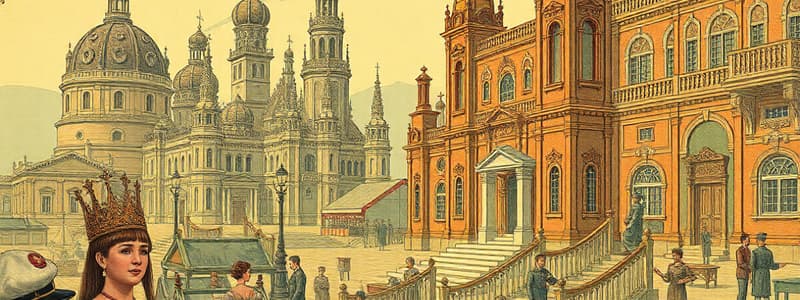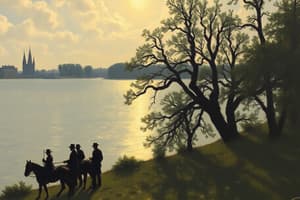Podcast
Questions and Answers
Which of the following empires did NOT exist in Europe in 1914?
Which of the following empires did NOT exist in Europe in 1914?
- Austro-Hungarian Empire
- Ottoman Empire
- German Empire
- Napoleonic Empire (correct)
What was a significant factor contributing to tensions in the Balkan region in 1914?
What was a significant factor contributing to tensions in the Balkan region in 1914?
- Presence of abundant natural resources
- Competing ethnic and national aspirations (correct)
- Strong military alliances with major powers
- High levels of economic prosperity
Which area did the Russian Empire encompass in 1914?
Which area did the Russian Empire encompass in 1914?
- Parts of Eastern Europe and Asia (correct)
- Central Europe
- Northern Africa
- The Arabian Peninsula
How did nationalism impact smaller states in Europe before the outbreak of World War I?
How did nationalism impact smaller states in Europe before the outbreak of World War I?
Which statement best describes the political landscape of Europe in 1914?
Which statement best describes the political landscape of Europe in 1914?
What role did military preparedness play in the political tensions of Europe prior to World War I?
What role did military preparedness play in the political tensions of Europe prior to World War I?
Which empire controlled a significant portion of the Balkans in 1914?
Which empire controlled a significant portion of the Balkans in 1914?
What was a characteristic of nation-states in Europe in 1914?
What was a characteristic of nation-states in Europe in 1914?
Flashcards
European Empires 1914
European Empires 1914
A complex political structure in Europe in 1914, dominated by empires like Austro-Hungarian, German, Russian, and Ottoman.
Balkan Instability
Balkan Instability
The volatile political region in the Balkans characterized by competing ethnic and nationalistic desires.
Nationalism in Europe
Nationalism in Europe
Strong feelings of national identity, often leading smaller nations to strive for independence from empires.
Complex Alliances
Complex Alliances
Signup and view all the flashcards
Military Build-Up
Military Build-Up
Signup and view all the flashcards
Austro-Hungarian Empire
Austro-Hungarian Empire
Signup and view all the flashcards
Contested Borders
Contested Borders
Signup and view all the flashcards
WWI Trigger
WWI Trigger
Signup and view all the flashcards
Study Notes
Political Landscape of Europe in 1914
- The map of Europe in 1914 displayed a complex network of empires, kingdoms, and independent states.
- Major empires included the Austro-Hungarian Empire, the German Empire, the Russian Empire, and the Ottoman Empire.
- Several smaller, independent countries dotted the map, including the United Kingdom, France, Italy, and the various Balkan states.
- Nationalism was a significant force in Europe, and many of these smaller nations sought independence from the larger empires.
Key Empires and their Territories
- The Austro-Hungarian Empire encompassed a vast area in Central Europe, including parts of modern-day Austria, Hungary, and numerous other nations.
- The German Empire controlled significant portions of Central Europe, including present-day Germany, parts of France (Alsace-Lorraine), and surrounding regions.
- The Russian Empire spanned a vast area stretching across Eastern Europe and into Asia.
- The Ottoman Empire controlled a large portion of the Balkans, the Middle East, and North Africa.
Nation-States and their Borders
- Several nation-states existed, but their borders were not always clearly defined and were often contested. France, Italy, and the UK were notable examples of established nations.
- Parts of Europe, particularly the Balkans, were a volatile mix of diverse ethnic groups, making for a complex region politically.
- This mix of nations and empires often created conflicts and tensions over territory and influence.
The Balkan Peninsula
- The Balkans were a particularly unstable region, rife with competing ethnic and national aspirations.
- Rivalries for territory and influence among various Balkan states and empires created a hotbed of tension.
- Multiple minority groups within the Balkan region presented challenges for existing, dominant political entities.
Alliances and Military Preparedness
- A complex web of alliances existed across Europe, which meant that a localized conflict could easily escalate into a larger war.
- Many nations actively engaged in military build-up, increasing the potential for conflict.
- The presence and strengthening of military capabilities compounded the tensions surrounding political and territorial disagreements.
Summary of the Map's Significance
- The 1914 map illustrates the complex political landscape of Europe, revealing the intricate interplay of empires, nation-states, and alliances that contributed to the outbreak of World War I.
- The intricate network of borders, alliances, and competing interests established a scenario ripe for large-scale conflict.
- The diversity and volatility of the Balkan Peninsula heightened the potential for a widespread war.
Studying That Suits You
Use AI to generate personalized quizzes and flashcards to suit your learning preferences.
Description
Explore the complex political landscape of Europe just before World War I. This quiz covers the major empires, their territories, and the rising nationalism that influenced many nations. Test your knowledge of the political entities and their relationships during this pivotal moment in history.




